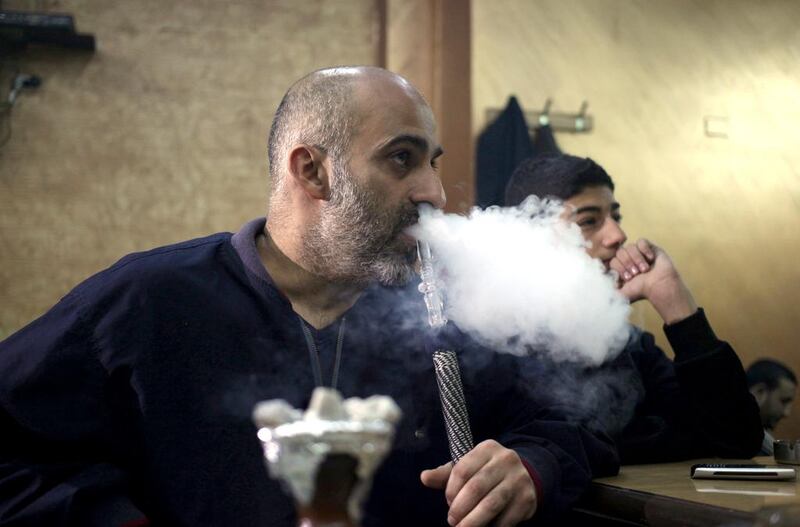AMMAN // In Jordan, a country where smoking is so popular that motorists can be seen puffing away on miniature water pipes in traffic, the government wants to enforce a smoking ban in restaurants, cafes and other public places. The ban, coming from a law passed in 2008 but not fully enforced, also would see the government revoke licences of all 6,000 coffee shops that serve shisha by the end of this year.
But business owners and smokers are criticising the push, saying it goes against the culture of a country where smoking is seen as a sign of manhood.
"We are caught between a rock and a hard place whereby the government is trying to force a closure of our businesses," said Mazen Alsaleh, who owns 14 coffee and shisha shops around the country. "I am not defending the shisha or smoking, but we must defend our investments."
The pastime of smoking shisha is ingrained in Jordanian culture from the time of the Ottoman Empire. Mourners receive cigarettes at wakes, while delivery companies only supplying hookahs have sprouted across the country.
The World Health Organisation estimated last year that nearly half of Jordan's men smoke tobacco on a daily basis, while a third of young men do. Women smoke at a much lower rate.
While smoking is culturally embraced, it's also aided by low-cost cigarettes. A pack of local cigarettes sells at less than Dh8, while foreign tobacco is slightly more expensive. Last year, local tobacco manufacturers reduced their prices by up to 15 per cent to compete with cheap cigarettes smuggled in from Syria. Health ministry statistics show that Jordanians spend the equivalent of US$1 billion (Dh3.67bn) annually on tobacco.
The health minister Ali Hyasat, who is spearheading the effort to enforce the smoking ban, said the measure was meant to "save lives, not businesses".
The law also prohibits selling tobacco to those under the age of 18, but shop owners have rarely abided by the law. Violators are subject to imprisonment for up to one month or a fine of up to $35.
Across the Middle East, there are similar indoor smoking bans in place in Lebanon and some Arab Gulf countries. The UAE tightened its own smoking ban last week. The Emirates made it illegal to smoke in car if a child younger than 12 was present and announced a fine of between Dh500 and Dh10,000 for selling tobacco to minors.
The new push to enforce Jordan's law in its entirety by December has many angry.
"Why is the government infringing on our privacy?" asked social worker Haneen Ramahi, 34. "Smoking is a matter of a personal choice. If I decide to kill myself, I'm free to do that."
* Associated Press
Jordan’s smokers and businesses decry smoking ban
The ban will revoke licences of all 6,000 coffee shops that serve shisha by the end of this year.

More from the national




